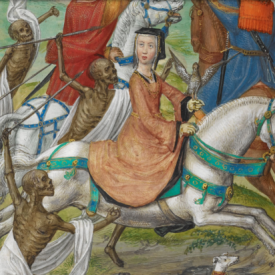
Fear of Death

I have a fear of death or death anxiety - what should I do?
“This pervasive fear and disdain of death, though amplified in Western cultures, is primal and archetypal.” Here’s an excellent breakdown on death anxiety from Psychology Today.
For many, the best place to start facing down your fear of death is to define what it is about death that scares you. Here’s a video about all the reasons us humans have trouble coming to terms with death – Why Are You Afraid of Death?
Once you know why you’re afraid, there are exercises you can do to dive into the fear. Meditating on what will become of your dead body can prove immensely helpful (it can be great– we promise!). Here is another episode of Ask a Mortician, addressing how to do just that, called Confronting Your Death.
Ready to go deeper? You may have read about living funeral ceremonies, which originated in South Korea. These are guided meditations and activities that participants say are life affirming. You can experience a virtual living funeral ceremony here. Trusted colleague Alua Arthur offers a guided meditation series online that allows you to contemplate your body’s eventual end, and she also collaborated our founder to create a whole course dedicated to understanding and reducing your death fears. Also, check out death positive artist, A.J. Hawkins, who began studying decomposition because she was a death-phobic.
For teens and young adults who are experiencing death related anxiety or who want to talk about death and grief our director has some advice for you in What’s Death Positivity and How Can It help Us? If you prefer podcasts, you can also hear Sarah address the subject on the Death episode of the I’m Afraid That Podcast.
You should also check out this wonderful article from Ask a Mortician producer and writer, Louise Hung on living with death anxiety, Life, Death, and the Anxiety In-Between.
It’s important to remember that being death positive does not mean you don’t fear death, in fact it is something we believe everyone (including us!) struggles with. Instead, it is the willingness to understand those fears and how they manifest in ourselves, others, and the world around us. Read our manifesto on the topic, titled, On the Fear of Death.
Won't thinking about death be depressing?
We don’t think so! There can be difficult aspects of course– no one said being mortal was easy. But, on balance, repression and denial of our fears and emotions is much worse.
But don’t take our word for it. The New York Times says– To Be Happier, Start Thinking More About Your Death. Or read about the 9 Reasons Why People Who Constantly Think About Death Are More Alive.
It is important to note that avoiding thoughts about death or defining it is in itself a form of privilege. Many people are forced face death in their daily lives. To learn more start with this piece on Cultural Death Illiteracy as Applied to Terror Management Theory.
We also want to note that the ways people feel comfortable engaging with death looks different for everyone-what may be uncomfortable for one person could be a perfect for another. Death engagement requires a lot of discomfort, but should also be paired with understanding, and compassion.
Thinking of death isn’t just about self fulfillment or happiness. Our future may depend on it. Sheldon Solomon says in The Atlantic that “If you look at the problems that currently befall humanity—we can’t get along with each other, we’re pissing on the environment, [there’s] rampant economic instability by virtue of mindless conspicuous consumption—they’re all malignant manifestations of death anxiety running amok.”
Are there other ways our fear of death affects our behavior?
Oh, you betcha.
Our favorite thinker in this area is Ernest Becker.
Becker was “an American cultural anthropologist and interdisciplinary thinker and writer. He wrote several books on human motivation and behavior, most notably the 1974 Pulitzer Prize-winning work, The Denial of Death. In it, he argues that “the basic motivation for human behavior is our biological need to control our basic anxiety, to deny the terror of death.” (Keen 1973). Becker suggested that a significant function of culture is to provide successful ways to engage in death denial.”
Becker didn’t just influence the Death Positive movement. He also influenced a group of psychologists who developed Terror Management Theory (TMT).
“The theory was inspired by the writings of Becker, and was initiated by two relatively simple questions: Why do people have such a great need to feel good about themselves?; and Why do people have so much trouble getting along with those different from themselves?”
More explanation on How the Unrelenting Fear of Death Shapes Our Behavior.
It is likely that the fear of death has influenced major events in world history. Several people, including Caitlin in this video, have shown how Donald Trump won the US Presidential election, and gained a blindly loyal following by employing death and death imagery

